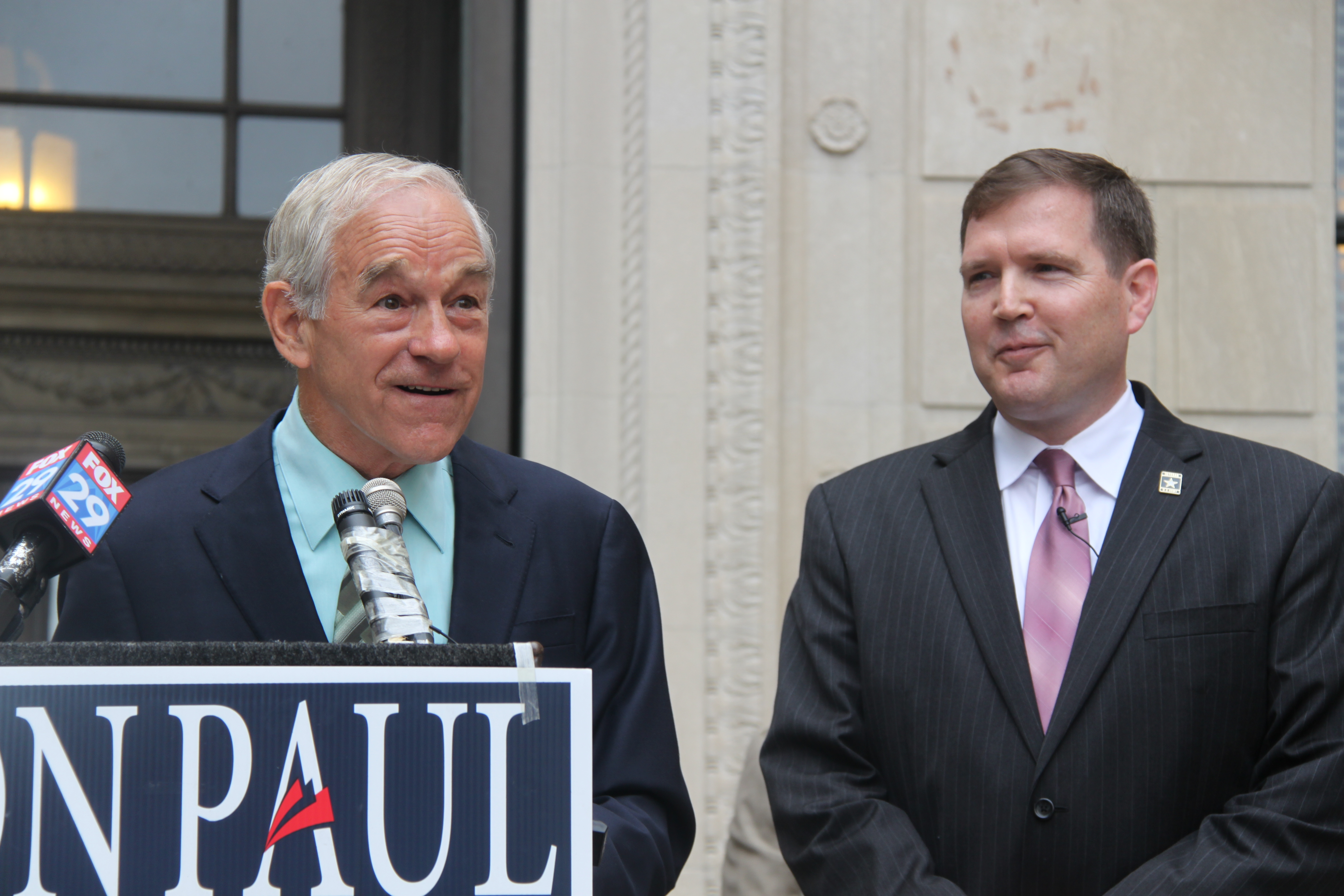In case you didn’t see it, Sunday’s Press featured a pair of dueling Dohertys. We had Republican state Senator Michael Doherty hawking his proposal to dedicate a certain portion of locally collected state sales tax to pay for the beaches and our own Mayor Matt Doherty bashing the idea.
Lets have a look at the two pieces, with my observations in red italics.
Full disclosure: I am a big fan of the senator. I lobbied very hard to try to help pass his Fair School Funding plan a few years ago and was thrilled when he endorsed Ron Paul in 2012.
So let’s have a look at the plan:
Free beaches: Everyone should be able to enjoy
Given the substantial public investment being made to rebuild our beaches following superstorm Sandy, now is the time for state policymakers to consider ways to improve beach access for all New Jersey residents.
I have proposed legislation, S-648, that would require towns that accept state or federal beach replenishment funds to provide free beach access, and to provide free public toilet facilities for beachgoers from Memorial Day to Labor Day.
Outside of New Jersey, there are few places in the country that charge a fee just to step on the beach. Actually when people complain about Jersey, that fact is often mentioned.
If state and federal taxpayers pick up the tab for rebuilding New Jersey’s storm-damaged beaches, our residents should have access to those beaches without being required to pay additional beach tag fees. By that reasoning, we should all be able to visit the Smithsonian free because part of the $60 billion Sandy pork bill went for renovations to that museum. Also some went to Alaskan fisheries but we are not going to get any free fish, are we? Taxpayers from outside the area should not have been forced to pay for rebuilding in the first place.
These same towns should also provide adequate restroom facilities for the public to comfortably enjoy a day at the beach.
The refusal by some coastal communities to provide easily accessible bathrooms tends to discourage non-residents from visiting beaches they have every right to use. Obviously he’s not talking about us. Of course anywhere that large crowds are expected, whoever is in charge must provide toilets.
Moreover, inadequate parking and the lack of readily available beach access points fuels speculation that some beachfront homeowners think of these taxpayer-supported public resources as their own private oases for their use alone. Again, doesn’t apply here.
We must dispel that notion and make clear that these state treasures exist for all to enjoy.
I understand the substantial expenses that coastal municipalities bear for beach cleaning, lifeguards and maintaining order and public safety for both residents and the many tourists who visit their communities each year.
I am not suggesting that local property taxpayers be forced to shoulder the burden of those beach-related expenses. To the contrary, my legislation would return to beach towns a portion of the taxes collected by businesses within their borders to replace the revenue generated by beach tags.
Under S-648, beach towns would receive monthly distributions from the state equal to 2 percent of their sales and use tax collections from the previous month.
In total, my proposal would return tens of millions of dollars to beach towns, certainly in the ballpark of what would be needed to adequately replace beach tag fees. Of course we would have to look at the numbers. Remember though that a big chunk of what we spend at the beach is for badge sellers, badge checkers at the entrances, and cops to walk around checking badges. Under Doherty’s plan we would only need to pay for the lifeguards and to clean and groom the beach. Of course if you’re an elected official with the power to influence who gets hired for 50 or so plum jobs then you might not see the reduced need for manpower as such a good thing.
I honestly don’t think the state will allot us less than what is legitimately needed to carry out our responsibilities as custodian of the beaches. Of course Belmar thinks that any expense related to being a resort town should be paid by someone else, but what about the fact that somewhere over a third of our ratables are summer houses and their owners use much less of our services than year round residents and they don’t use the school at all? I think that should offset much of the extra expenses that come with being a resort town.
Local businesses and the shore economy would receive an additional boost when families who no longer have to pay $25 or $30 for beach tags have extra cash to spend on meals, souvenirs and entertainment. I’m skeptical. If they’re smart they’ll just keep the money.
That extra economic activity would result in more taxable sales within beach municipalities and an even greater return of sales tax revenues to those towns. Again, that’s completely speculative.
New Jersey may also want to consider how other beach destinations fund their beaches. For example, Myrtle Beach awards franchises to businesses to manage certain sections of the city’s beach. In exchange for the right to rent chairs and umbrellas to beachgoers, the franchisees pay for lifeguards and beach cleaning in the areas they manage. I suggested we try something like this over and over again in the fall and winter of 2012. And I warned that if we took a lot of state and/or federal money that it would certainly come with strings attached.
While the Myrtle Beach model is not perfect, elements could be adapted for use in New Jersey.
Michael Doherty is a Republican state senator who represents the 23rd Legislative District in Hunterdon County.
And now Mayor Doherty makes his case:
Free beaches: Political stunt in Trenton
Eliminating beach fees sounds very attractive, and is politically popular, but upon examination, it proves to be unattainable. Well far be it from this mayor to do something simply because it’s politically popular but the fact that most states do have free beaches proves, actually, that it is attainable. Even low tax states like Florida and New Hampshire have free beaches. It dies, along with other politically popular ideas, because it runs into the adage that “nothing in life is free.” Someone always pays. Oh that’s rich. The entire political philosophy of the Democratic left can be summed up in two words: Free Stuff.
Our current system of paying for the beach is both fair and provides options to consumers.
First, if you don’t go to the beach, you don’t pay for it. Putting the expense of cleaning, providing public safety and providing lifeguards onto taxpayers who never step foot on the beach is unfair. Was it fair to put the expense of building the new boardwalk onto taxpayers who will never use it?
Second, one of the very Jersey aspects of the entire Jersey Shore is that each Shore town has its own character. They run the range of full-blown amusement park to quiet, tranquil setting. And how would Senator Doherty’s bill change that? When a middle-class family wants to get away for the day, the Jersey Shore provides a wide variety of options. If the beach were free, maybe poor people could get away for the day too. Why do we only care about the middle class having some fun?
In Belmar, adults pay a daily price of only $7, and children 15 and younger are free. So a family of four can enjoy a day at the beach for only $14. In addition, we have free playgrounds and allow food on the beach. So while we always encourage visitors to shop in our small businesses, they have the ability to keep their visit very inexpensive. Compared to going to the movies, where a family of four will spend $30 or more for a two-hour experience, our beach is a great value for families. Free is a better value.
For that $7, patrons are able to enjoy a clean, safe environment. Our Department of Public Works cleans the beach starting at 4:30 a.m. and it goes all day. Our Police Department patrols both the boardwalk and beach to ensure there is public safety even in very large crowds. Oh yeah, that beach is a real hotbed of criminal activity. Actually all the police patrols are centered around making sure visitors pay for parking and for badges. And I guess they’re also now keeping us safe from smokers. And lastly, our lifeguards keep watch over tens of thousands of swimmers. They save hundreds of people each year from dangerous conditions that can appear out of nowhere in the ocean. It is important to note that the ocean is not a pool; it is not calm like in the Caribbean or the Gulf Coast. The North Atlantic that we swim in and enjoy can turn dangerous quickly. No one is suggesting we should have dirty beaches with no lifeguards. That will be paid for by the state under the Senator’s plan.
After Sandy, Belmar and many other beaches needed beach replenishment to rebuild the beach and protect our towns. There is now a proposal in Trenton that if a town like ours accepted federal dollars for beach replenishment, that we should be prohibited from charging beach fees. While this may be politically popular, it is another bad Trenton idea. The beach replenishment has absolutely nothing to do with the operations of the beach (cleaning, patroling and lifeguards). So to link the two is disingenuous. If we followed the same logic, since NJ Transit received federal dollars to replace buses and trains lost during Sandy, then we should all be able to ride mass transit for free. Well he makes a good point except that the feds shouldn’t have paid for NJ Transit’s losses in the first place.
So while it looks attractive, eliminating beach fees is just another political stunt coming out of Trenton. After Sandy we need their help, not more nonsense. Typical Doherty, impugning the motives of people who disagree with him.
Matthew J. Doherty is mayor of Belmar.
So while I’m not completely convinced, I do think we should have a serious look at Senator Doherty’s bill. As long as the revenue is sufficient to pay for legitimate beach-related expenses, we could see numerous benefits:
The overall cost of running the beach would be greatly reduced. We would not need to manufacture badges and pay the cost of selling them and checking them. That’s huge (if your goal is to save money.) And honestly I never liked having to have cops walk around looking at everybody’s swimsuit to see if they have a badge on it. Plus the more we need the police to interact with people (as we add all sorts of new “crimes”) the greater chance that there will be some sort of incident that could result in injuries and lawsuits. It’s always best if we can just leave people alone.
But the main reason I like the plan:
I’m tired of sticking holes in my sexy designer swim trunks.


Post a Comment